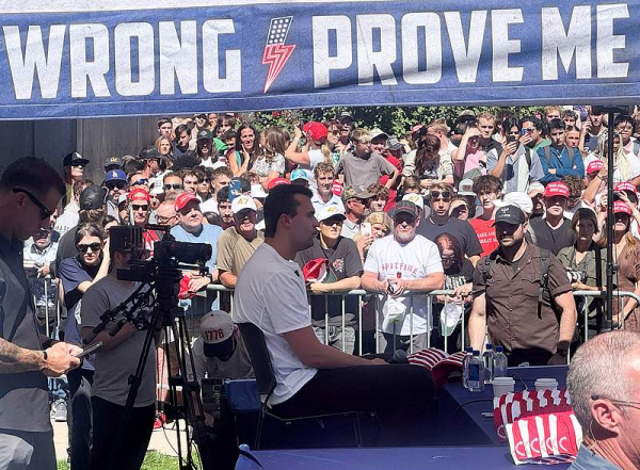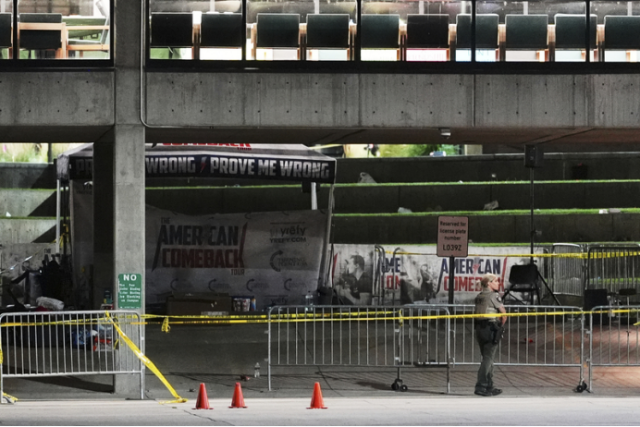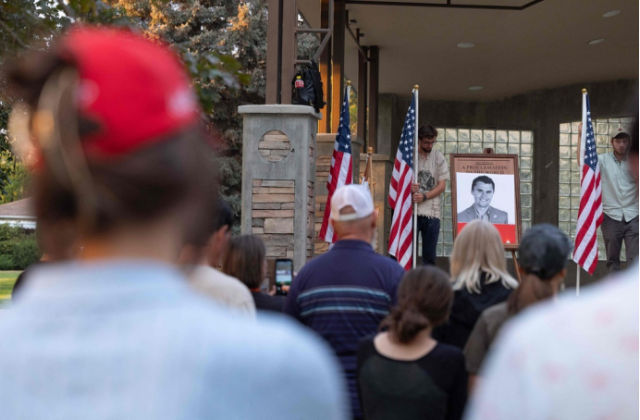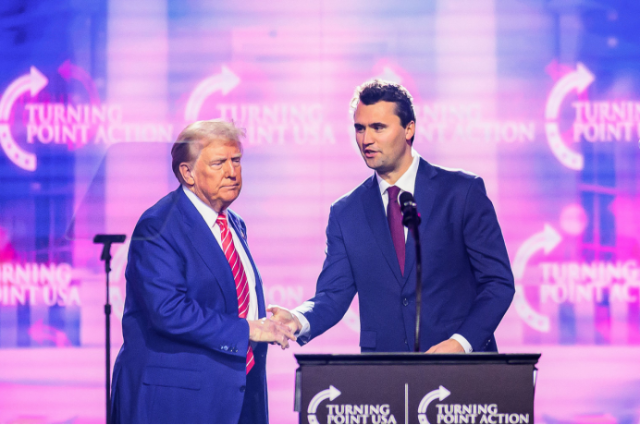On September 10, Charlie Kirk, the 31-year-old conservative firebrand and founder of Turning Point USA (TPUSA), was assassinated by a single, precise shot to the neck. The tragedy unfolded at Utah Valley University, twenty minutes into a provocative Q&A session—a format in which Kirk thrived.
Kirk was sparring with an audience member over transgender involvement in mass shootings when the gunfire rang out. In the tragic roll call of violence in American public life, his name joins what has fast become a long list.

Right-wing youth activist and influencer Charlie Kirk speaking during a public event at Utah Valley University minutes before he was shot in Orem, Utah, on September 10, 2025. (Photo: CFP)
Chaos erupted; students scrambled as Kirk fell. The shooter, having allegedly fired from a rooftop, remains at large, a ghost haunting an investigation now involving local, state, and federal agencies.
Two individuals were briefly detained, one charged with obstructing justice, but both were released—leaving a nation grasping for answers in the aftermath.
A disoriented nation in grief
The assassination of Charlie Kirk was met with swift and universal condemnation from across the political spectrum. President Donald Trump, a survivor of assassination attempts himself, announced the death on social media, mourning the man who "understood the Heart of the Youth" while blaming the "radical left." From the Capitol, House Speaker Mike Johnson pleaded, "This is not who we are."
Yet within minutes, a moment of silence in the House devolved into partisan bickering—prayers versus calls for gun control, and Utah's Republican Governor Spencer Cox labeled it a "political assassination."

A sheriff monitors the scene at Utah Valley University after Charlie Kirk was shot and killed Thursday, Sept. 11, 2025, in Orem, Utah. (Photo: CFP)
While figures from both parties—including former Presidents Biden and Obama—denounced the violence, many on the far-right were quick to demand retaliation. Prominent figures labeled the left a "party of murder" and openly called for "war," demonstrating how quickly such events can be weaponized to fuel further division and threaten a vicious cycle of retaliation.
How Kirk's words returned with a vengeance
Kirk was more than a casualty; he was a catalyst. A charismatic and combative figure who founded Turning Point USA at just 18 years old, he rapidly rose as a prominent star within the conservative movement—some even speculated about a future presidential bid.
Through speeches, articles, podcasts, and live debates, Kirk energized young audiences with his uncompromising conservative vision. He openly argued that racial justice movements were misguided, asserted that "Black people had better living conditions and lower crime rates under slavery," and claimed that even victims of rape should be denied access to abortion.

People attend a vigil for youth activist and influencer Charlie Kirk, who was shot at a public event at Utah Valley University, in Orem City Center Park, Orem, Utah (Photo: CFP)
He frequently insisted that annual gun deaths were a "reasonable cost" for upholding Second Amendment rights—a stance that now hangs in the air with devastating irony. His death embodies a brutal paradox: slain by the very violence he rationalized, during a forum where he was discussing gun violence.
His killing is not an anomaly but a feature in an era of violent populism, reflecting what researcher Robert Pape calls a "powder keg" of acceptance of political violence. College campuses, once battlegrounds of ideas, have now become arenas of life and death.
America's roll call of public violence in recent years
This incident is far from an isolated event. It is the latest eruption in a long and troubled history of political violence in the United States, a history that includes the assassinations of presidents like Abraham Lincoln and civil rights leaders like Martin Luther King Jr., whose death in 1968 sparked riots in over 120 cities.
Recent years have witnessed an alarming normalization of political violence: besides the two assassination attempts on Trump in 2024—one at a rally that left a supporter dead and Secret Service agents wounded—the country has seen the killing of a Democratic Minnesota state lawmaker and her husband in June 2025, the arson attack on Pennsylvania Governor Josh Shapiro's home in April 2025, and the storming of the U.S. Capitol on January 6, 2021.

Right-wing activist Charlie Kirk speaks on stage with President Donald Trump at America Fest 2024 in Phoenix, Arizona, on December 22, 2024. (Photo: CFP)
Disturbingly, surveys indicate a growing acceptance of political violence among Americans. A May survey by Robert Pape, director of the University of Chicago Project on Security and Threats, revealed that about 40% of Democrats supported the use of force to remove Trump from the presidency, and about 25% of Republicans supported using the military to stop protests against Trump's agenda.
These numbers, which have more than doubled since last fall, underscore a nation increasingly willing to justify extremism for political ends.
In the end, Kirk's death holds a dark mirror to America: a nation perpetually at war with itself, armed with both rhetoric and weapons, forever balancing on the brink of its next self-inflicted tragedy.
Reporter: Guo Zedong
Editor: Yuan Zixiang, James Campion, Shen He
















